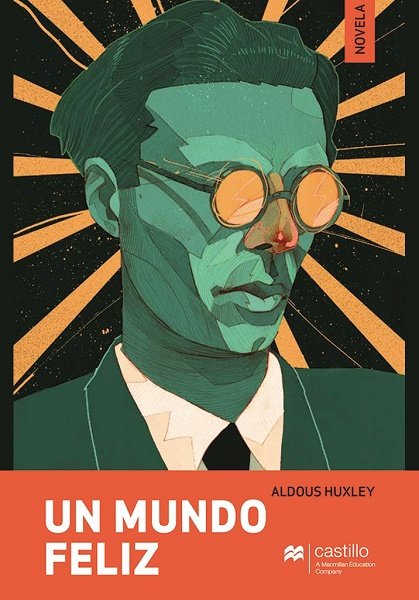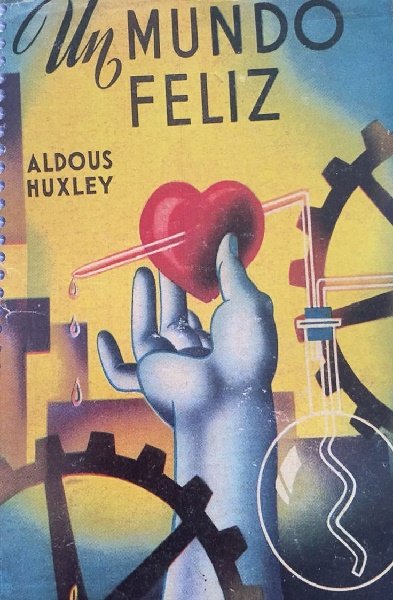Otro grande: Aldous Huxley cumple en este año un aniversario a tener en cuenta: son 130 años de su nacimiento, el 26 de julio de 1894 en Inglaterra. No sé cuántos de los usuarios de esta plataforma conocerán de él y/o habrán leído algo de su obra literaria. Siendo un novelista, cuentista, ensayista y cronista de amplia y valiosa producción, es su novela Un mundo feliz, publicada en 1932, de carácter distópico, la que lo hará más famoso. Sobre su vida y obra publiqué un post el año pasado (que pueden ver aquí), por lo que no volveré a esos aspectos. Escribí una especie de microficción, consistente en un texto en el cual Huxley respondería a la pregunta de un periodista de The New York Times, ¿Por qué Un mundo feliz?
Another great: Aldous Huxley celebrates an anniversary worth remembering this year: it is 130 years since his birth, on July 26, 1894 in England. I don't know how many of the users of this platform will know him and/or have read some of his literary work. Being a novelist, short story writer, essayist and chronicler of extensive and valuable production, it is his novel Brave New World, published in 1932, of a dystopian nature, which will make him most famous. I published a post about his life and work last year (which you can see here), so I won't go back to those aspects. I wrote a kind of microfiction consisting of a text in which Huxley would answer a journalist from The New York Times's question, Why Brave New World?

Imaginé Un mundo feliz como un modo de atreverme a exorcizar esa amenaza que advertía en mi tiempo. Ya habían comenzado las manipulaciones sobre los individuos, convertidos en fichas de un juego peligroso, fuera por la experimentación científica, de ahí la reproducción y el placer sexual artificiales, o por la tecnología precozmente invasiva, que se concreta en la hipnopedia. El incipiente nazismo y el ya enfilado comunismo soviético daban muestras de terribles tendencias a inusitadas maniobras, aparte de lo suministrado por el mundo occidental moderno.
El afán de felicidad puede ser una sublime trampa, pensé entonces, y sigo creyéndolo. En aras de ella pueden incubarse, producirse y promocionarse admirables, a la par que atroces estrategias, con el ideal del más alto bienestar humano. Y lamentablemente así ha ocurrido.
Nunca fui un pensador dogmático, incluso siempre me atrajo cierta tendencia ácrata. Creí en y defendí el derecho a la libertad, pero también la necesidad de la espiritualidad, el equilibrio y la mesura (los sabios griegos lo advirtieron al penar la hybris). Nunca fui un modelo de nada, y, como todo ser humano, transgredí mis propios límites. Pero siempre idealicé un mundo mejor, a conciencia de que las utopías son creaciones de lobo feroz ataviado de caperucita (perdonen la imagen simple). Y allí quedó mi última novela, La isla.

I imagined Brave New World as a way to dare to exorcise that threat that I saw in my time. The manipulations of individuals had already begun, turning them into pieces in a dangerous game, either through scientific experimentation, hence artificial reproduction and sexual pleasure, or through early invasive technology, which is embodied in hypnopedia. The incipient Nazism and the already established Soviet Communism showed terrible tendencies towards unusual handlings, apart from what was provided by the modern Western world.
The desire for happiness can be a sublime trap, I thought then, and I still believe it. For the sake of it, magnificents, as well as atrocious strategies can be incubated, produced and promoted, with the ideal of the highest human well-being. And unfortunately this has happened.
I was never a dogmatic thinker, and I was always attracted to a certain anarchist way of thinking. I believed in and defended the right to freedom, but also the need for spirituality, balance and moderation (the Greek sages warned about this when they suffered from hybris). I was never a model of anything, and, like every human being, I transgressed my own limits. But I always idealized a better world, aware that utopias are the creations of a ferocious wolf dressed as Little Red Riding Hood (forgive the simple image). And there was my last novel, The Island.





